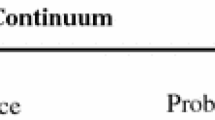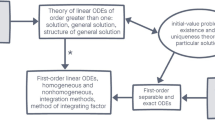Abstract
We argue that dialogic theory, inspired by the Russian scholar Mikhail Bakhtin, has a distinct contribution to the analysis of the genesis of understanding in the mathematics classroom. We begin by contrasting dialogic theory to other leading theoretical approaches to understanding conceptual development in mathematics influenced by Jean Piaget and Lev Vygotsky. We argue that both Piagetian and Vygotskian traditions in mathematics education overlook important dialogic causal processes enabling or hindering switches in perspective between voices in relationship. To illustrate this argument, we use Piagetian-, Vygotskian- and Bakhtinian-inspired approaches to analyse a short extract of classroom data in which two 12-year-old boys using TinkerPlots software change their understanding of a probability problem. While all three analyses have something useful to offer, our dialogic analysis reveals aspects of the episode, in particular the significance of the emotional engagement and the laughter of the students, which are occluded by the other two approaches.


Similar content being viewed by others
References
Artigue, M. (2002). Learning mathematics in a CAS environment: The genesis of a reflection about instrumentation and the dialectics between technical and conceptual work. International Journal of Computers for Mathematical Learning, 7(3), 245–274.
Bakhtin, M. M. (1968). Rabelais and his world (H. Iswolsky, Trans.) Cambridge, MA: MIT Press.
Bakhtin, M. M. (1981). The dialogic imagination: Four essays by M.M. Bakhtin (C. Emerson & M. Holquist, Trans.). Austin, TX: University of Texas Press.
Bakhtin, M. M. (1984). Problems of Dostoevsky’s poetics (C. Emerson, ed. and Trans.). Minneapolis: University of Minnesota Press.
Bakhtin, M. M. (1986). Speech genres and other late essays (V. W. McGee, Trans.). Austin, TX: University of Texas Press.
Dawes, L., Mercer, N., & Wegerif, R. (2000). Thinking together: A programme of activities for developing speaking, listening and thinking skills for children aged 8–11. Birmingham: Imaginative Minds Ltd.
Drijvers, P., Kieran, C., & Mariotti, M. A. (2010). Integrating technology into mathematics education: Theoretical perspectives. In C. Hoyles & J. B. Lagrange (Eds.), Mathematics education and technology—Rethinking the terrain (pp. 89–132). New York: Springer.
Guin, D., & Trouche, L. (1999). The complex process of converting tools into mathematical instruments: The case of calculators. International Journal of Computers for Mathematical Learning, 3, 195–227.
Hand, V. (2012). Seeing culture and power in mathematical learning: Toward a model of equitable instruction. Educational Studies in Mathematics, 80, 233–247.
Kazak, S., Wegerif, R., & Fujita, T. (2014). Supporting students’ probabilistic reasoning through the use of technology and dialogic talk. In S. Pope (Ed.), Proceedings of the 8th British Congress of Mathematics Education (pp. 215–222). Nottingham: BCME.
Kidron, I., Bikner-Ahsbahs, A., Monaghan, J., Radford, L., & Sensevy, G. (2012). CERME7 Working Group 16: Different theoretical perspectives and approaches in research in mathematics education. Research in Mathematics Education, 14, 213–214.
Konold, C., & Miller, C. D. (2011). TinkerPlots2.0: Dynamic data exploration. Emeryville, CA: Key Curriculum.
Kozulin, A. (1998). Psychological tools: A sociocultural approach to education. Cambridge, MA: Harvard University Press.
Littleton, K., Light, P., Joiner, R., Messer, D., & Barnes, P. (1998). Gender, task scenarios and children’s computer-based problem solving. Educational Psychology, 18(3), 327–340.
Mason, J. (1989). Mathematical abstraction as the result of a delicate shift of attention. For the Learning of Mathematics, 9, 2–8.
Mason, J., & Davis, J. (1988). Cognitive and metacognitive shifts. In A. Borbas (Ed.), Proceedings of the 12th conference of the International Group for the Psychology of Mathematics Education (Vol. 2, pp. 487-494). Veszprem, Hungary: PME.
Marteinson, P. (2006). On the problem of the comic: A philosophical study on the origins of laughter. Ottawa, Canada: Legas Press.
Matusov, E. (2009). Journey into dialogic pedagogy. Hauppauge, NY: Nova Publishers.
Matusov, E. (2011). Irreconcilable differences in Vygotsky’s and Bakhtin’s approaches to the social and the individual: An educational perspective. Culture & Psychology, 17, 99–119.
Mercer, N. (2013). The social brain, language, and goal-directed collective thinking: A social conception of cognition and its implications for understanding how we think, teach, and learn. Educational Psychologist, 48(3), 148–168.
Mercer, N., & Sams, C. (2006). Teaching children how to use language to solve maths problems. Language and Education, 20, 507–528.
Mercer, N., Wegerif, R., & Dawes, L. (1999). Children’s talk and the development of reasoning in the classroom. British Educational Research Journal, 1, 95–111.
Monaghan, F. (2005). ‘Don’t think in your head, think aloud’: ICT and exploratory talk in the primary school mathematics classroom. Research in Mathematics Education, 7, 83–100.
Mugny, G., & Doise, W. (1978). Socio-cognitive conflict and structure of individual and collective performances. European Journal of Social Psychology, 8, 181–192.
Piaget, J. (1970). Genetic epistemology. New York, NY: Columbia University Press.
Plato (2006). Phaedrus (B. Jowett, Trans.). (Original work published 360 BCE) Retrieved from http://ebooks.adelaide.edu.au/p/plato/p71phs/.
Radford, L. (2000). Signs and meanings in students’ emergent algebraic thinking: A semiotic analysis. Educational Studies in Mathematics, 42, 237–268.
Radford, L. (2003). Gestures, speech, and the sprouting of signs: A semiotic-cultural approach to students’ types of generalization. Mathematical Thinking and Learning, 5, 37–70.
Rojas-Drummond, S. M., Albarrán, C. D., & Littleton, K. (2008). Collaboration, creativity and the co-construction of oral and written texts. Thinking Skills and Creativity, 3(3), 177–191.
Scott, S. (2013). Laughter—The ordinary and the extraordinary. The Psychologist, 26, 264–268.
Silverman, I. W., & Stone, J. M. (1972). Modifying cognitive functioning through participation in a problem-solving group. Journal of Educational Psychology, 68, 603–608.
Simon, M., Tzur, R., Heinz, K., & Kinzel, M. (2004). Explicating a mechanism for conceptual learning: Elaborating the construct of reflective abstraction. Journal for Research in Mathematics Education, 35, 305–329.
Solomon, Y. (2012). Finding a voice? Narrating the female self in mathematics. Educational Studies in Mathematics, 80, 171–183.
Trouche, L. (2004). Managing the complexity of human/machine interactions in computerized learning environments: Guiding students’ command process through instrumental orchestrations. International Journal of Computers for Mathematical Learning, 9(3), 281–307.
Vérillon, P. (2000). Revisiting Piaget and Vygotsky: In search of a learning model for technology education. Journal of Technology Studies, 26(1), 3–10.
von Glasersfeld, E. (1995). Radical constructivism: A way of knowing and learning. London: Falmer Press.
Vygotsky, L. S. (1978). In M. Cole, V. John-Steiner, S. Scribner, & E. Souberman (Eds.), Mind in society: The development of higher psychological processes. Cambridge, MA: Harvard University Press.
Vygotsky, L. S. (1986). Thought and language. Cambridge, MA: The MIT Press.
Walkerdine, V. (1990). Mastery of reason: Cognitive development and the production of rationality. London: Routledge.
Wegerif, R. (1999). Two models of reason in education. The School Field, 3–4, 76–105.
Wegerif, R. (2005). Reason and creativity in classroom dialogues. Language and Education, 19(3), 223–238.
Wegerif, R. (2007). Dialogic, education and technology: Resourcing the space of learning. New York, NY: Springer.
Wegerif, R. (2011). From dialectic to dialogic: A response to Wertsch and Kazak. In T. Koschmann (Ed.), Theorizing practice: Theories of learning and research into instruction practice (pp. 201–222). New York, NY: Springer.
Wegerif, R., Boero, P., Andriessen, J., & Forman, E. (2009). A dialogue on dialogue and its place within education. In T. Dreyfus, R. Hershkowitz, & B. Schwarz (Eds.), Transforming knowledge in classroom interaction (pp. 184–199). London: Routledge.
Wells, G. (1999). Dialogic inquiry: Towards a sociocultural practice and theory of education. Cambridge: Cambridge University Press.
Wertsch, J. V. (1985). Vygotsky and the social formation of mind. Cambridge, MA: Harvard University Press.
Zack, V., & Graves, B. (2001). Making mathematical meaning through dialogue: “Once you think of it, the z minus three seems pretty weird”. Educational Studies in Mathematics, 46, 229–271.
Acknowledgments
The research study described in this article was supported by a Marie Curie Intra European Fellowship within the 7th European Community Framework Programme.
Author information
Authors and Affiliations
Corresponding author
Rights and permissions
About this article
Cite this article
Kazak, S., Wegerif, R. & Fujita, T. The importance of dialogic processes to conceptual development in mathematics. Educ Stud Math 90, 105–120 (2015). https://doi.org/10.1007/s10649-015-9618-y
Published:
Issue Date:
DOI: https://doi.org/10.1007/s10649-015-9618-y




